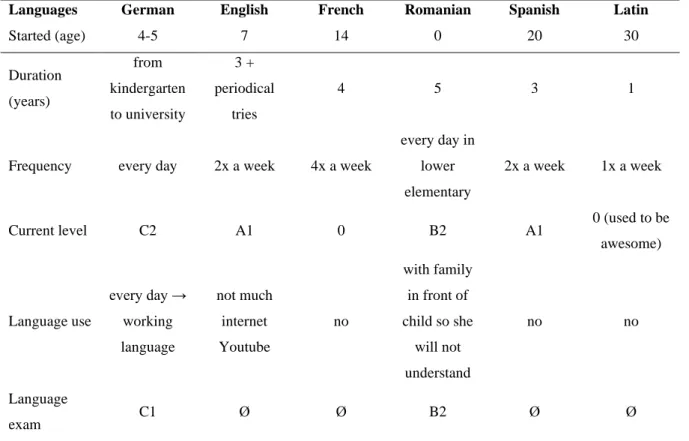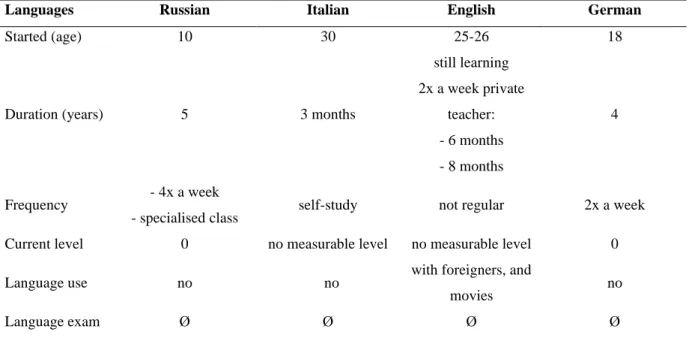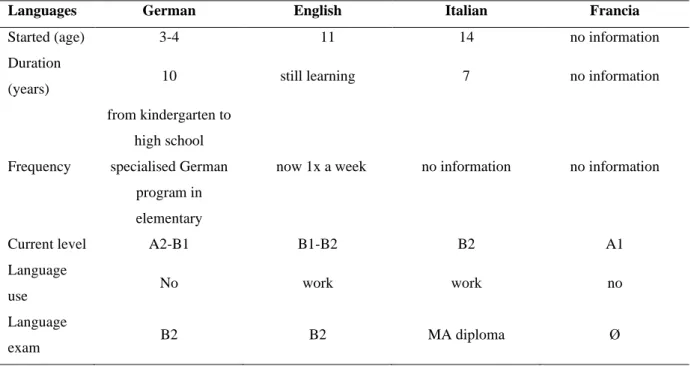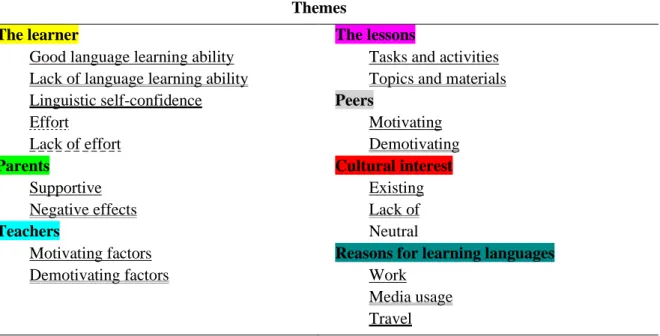By my signature below, I declare that my ELTE MA thesis titled An Interview Study on Motivation for Language Learning: The Case of English and Other Languages is entirely the result of my own work, and that I have not been awarded a degree for this work . In my dissertation I have quoted all sources (printed, electronic or oral) that I have faithfully used and always indicated their origin. The electronic version of my thesis (in PDF format) is a true representation (identical copy) of this printed version.
If this promise is found to be false, I realize that I will be subject to fines up to and including the forfeiture of the degree I have obtained with my thesis. Therefore, the purpose of this thesis was to investigate why some students could not master English, but succeeded in mastering a foreign language other than English. In addition, the study also found that regardless of age, teachers and classes also have a prominent role in language learning processes.
Introduction
What explanations do participants give for the differences in their level of English and another language. To answer these research questions, the research presented here consists of five main parts. After a short introduction to answer the research questions, it provides an overview of the relevant literature on motivational constructs, self-determination and attribution theory.
Finally, it will talk about the analysis process, in other words the coding and categorization of the collected data. In the fourth chapter, it discusses the emerging themes – for example parents, teachers or classroom tasks and topics – and relates them to the discussed literature. Finally, in the conclusion, it discusses the implications of the results, as well as the limitations and possible future research.
Literature review
- Motivation in education and foreign language learning
- The intrinsic and extrinsic continuum
- Instrumental and integrative motivation
- Demotivation
- Motivation in learning languages other than English
- Self-determination
- Attribution theory
In other words, if the motivation is extrinsic, the reason why someone does an activity lies outside the activity itself (Noels et al., 2019). In addition, this intrinsic motivation can be supported by a person's freedom to choose to participate in an activity (Patall, 2012). Amotivation can be summarized as the lack of value and/or perceived competence (Noels et al, 2019).
One of the most prominent sources of L2 motivation can be found in past experiences with learning and language (Csizér, 2019). Weiner's (2010) attributional categories can be placed in three dimensions: intrinsic – extrinsic, stable – unstable, controllable – uncontrollable. Williams and Burden (1997) point out that the way people view these dimensions can be highly personal.
Methods
- Context of the study
- Design of the study
- Participants
- The instrument and its pilot
- Data collection
- Data analysis
This fact is important for this study, as seven out of nine participants stated that they needed regular communication with strangers. Second, during the four decades of communism (between 1949 and 1989), Russian was a compulsory foreign language in all state schools (both primary and secondary), yet according to the 1990 national census (Statistical Yearbook of Hungary) only 1.5% people As for the participants of the present task, five out of eight of them were affected by this, as they grew up during communism.
The nationality of the population was chosen because the interviews had to be conducted in the L1 of the participants. This form of interview (as opposed to structured and unstructured) was chosen because the aim was to enable participants to fully explore and elaborate on the areas of the research questions without allowing them to stray too far off topic. After the pilot interviews – based on feedback from the subject supervisor and colleagues – the questions were slightly modified and.
However, the order, and sometimes the wording of questions, was tailored to the flow and rhythm of the interviews. Due to the ongoing Covid-19 situation at the time of the data collection phase (November and December 2020), all sessions were either online (Microsoft Teams©, Skype© or Google Meets©) or on the phone. If the information in the data analysis phase of the study was judged to be incomplete, participants were contacted either by phone or email for follow-up questions.
The participants were informed about what they have to do, the structure and purpose of the interview, as well as the fact that since they are doing the interviews voluntarily, they can withdraw at any time. In addition, there was no coercive influence as none of the participants were the researcher's students; moreover, there was no "power relationship between the researcher and the potential participants" (Riazi, 2006, p 107). And finally, the themes were arranged and synthesized according to the results of the literature review.
During several stages of the analysis, an expert, the subject supervisor, provided comments and feedback on the process.
Results
- The learner
- Ability and linguistic self-confidence
- Effort
- Parents
- Teachers
- The lessons: Tasks, activities, topics and materials
- Peers
- Reasons for learning foreign languages
She said all her language teachers had told her she had exceptional language learning skills. However, it was only Alexa (German) and Julia (Italian) who said their ultimate success in learning a foreign language was due to their efforts. Melissa - and also Barbara - also said that because of their already existing strong German.
In addition to this, Barbara also said that in her teenage years, because of her father and teachers - reasons that will be discussed in detail later - she did nothing to learn English. He also said that his parents should have explained to him why it is important to learn languages – especially English. George also said that his teachers showed very little enthusiasm in their subjects: "I could tell they were bored, they didn't want to be there".
Brian and Barbara said that the fact that their teachers were strict helped them study. In terms of teacher feedback, Alexa and Sally were the only ones who said their teachers praised them regularly. Sue also said that "back then it wasn't usual to give feedback other than grades".
All interviewees found the lack of free speaking activities extremely demotivating and said that this is one of the reasons they cannot speak English properly today. Sally and Julia said their teachers' (Russian, Italian and English) love of culture rubbed off on them too. Sue said that when she lived briefly in the Middle East, her English improved rapidly: “I had no choice.
I had to start speaking." And finally, Barbara also said that one of the biggest contributing factors to her success in German was that she learned it as if it were a first language. Apart from Sue, Melissa and Matt told all the participants that they need better English skills for their work. It feels so natural." Sally said that she feels that her Russian knowledge has become obsolete, and she.
Discussion
- What were participants’ views about their motivation to master a foreign language
- In their view, what motivation did the participants lack that led to them not being
- What views do participants express when explaining their perceived insufficient
- What explanations do participants give to the differences in their levels of English
This is a good example where learning occurs as a result of being together with and observing members of the target language community. Sally and Julia, however, stated that their teachers' love for the culture of the target language strongly motivated them: they internalized their teachers' love for the culture, which then developed into an internal one. Based on how many times they were mentioned and how much time participants spent talking about them; here the main reasons were a complete lack of intrinsic motivation, linguistic pleasure or urgency.
First – with the exception of Julia, who reported general language learning enjoyment – none of the participants expressed interest in the language itself or the culture of the countries where English is the mother tongue. English: everyone said that although a better command of the language would help them in their work and their hobbies, they did not actively want to improve their English. If we look at this from the perspective of the social-cognitive approaches to motivation (Woolfolk, 2016), it can be said that for Brian, George and Sally, even though the value of learning English is high, the cost is even higher; therefore, they are not motivated to master it.
Additionally, Brian and Matt also stated that one of the reasons they did not focus on learning English until they had the opportunity (i.e. in high school and early 20s) was because their parents did not explain to them why they are learning. languages in general, and English in particular, would benefit them in the future, so they did not fully understand its value. According to Boekaerts (2002) dimensions of task evaluation, this means that these participants did not enjoy the activities on the one hand, but did not see their value on the other hand. Of the nine participants, four said their level of English was lower than that of a second language.
With the exception of Melissa, the source of this difference can be found in the internal versus external continuum. While Barbara's reasons were on the one hand external - her father, teachers and methods; on the other hand, they were also emotional. Furthermore, while she had nothing bad to say about her German or English teachers and studying in Romania, she had almost no positive comments on the same topic in the Hungarian context.
Alexa, on the other hand, attributed her C2 level in German and A2 level in English to her life situation: the reason she mastered German was because she moved to Austria with her family; and although her English teachers were good, she never really had to use the language.
Conclusion
Therefore, the results of the comparison of learning a foreign language in Hungary in the 1960s and 1990s may not be completely reliable. Can foreign language learning strategies be turned into crutches?: A pilot study on the use of strategies by successful and unsuccessful language learners. Successful language learning in a corporate setting: The role of attribution theory and its relation to internalization and externalization.
New orientations in language learning motivation: Toward a model of intrinsic, extrinsic, and integrative orientations and motivation. An in-depth look at successful and unsuccessful students' learning strategy use in the context of Chinese EFL learning. Active human nature: Self-determination theory and the promotion and maintenance of sport, exercise, and health.
What do you think is your current level in the languages you have learned/learn.







